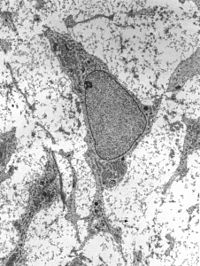
Photo from wikipedia
alternative target of all active TZD compounds, including rosiglitazone and pioglitazone. We also find it interesting that pioglitazone exhibits beneficial effects on NASH fibrogenesis in clinical trials, whereas the most… Click to show full abstract
alternative target of all active TZD compounds, including rosiglitazone and pioglitazone. We also find it interesting that pioglitazone exhibits beneficial effects on NASH fibrogenesis in clinical trials, whereas the most potent PPARc agonist of the clinically used TZDs, rosiglitazone, may have beneficial effects on some NASH endpoints, but does not affect fibrosis. One interpretation of this is that the limited dosing of rosiglitazone, attributed to potential PPARc-driven side effects, is insufficient to engage MPC and thus elicit the desired effects on fibrosis. Whereas the effects of MSDC-0602 on fibrosis have only been examined in experimental models, an ongoing phase II clinical trial has been initiated (EMMINENCE; NCT02784444). Drs. Musso and Gambino bring up interesting points regarding the observation of PPARc-sparing TZDs eliciting less secretion of the antifibrotic adipokine, adiponectin, in a clinical trial. It should be noted that this next-generation TZD still reduced fasting blood glucose and insulin sensitized. In addition, our studies found that genetic deletion of MPC2 in hepatocytes specifically or treatment of isolated stellate cells with MSDC-0602 reduced stellate cell activation and collagen expression. This suggests that there are adiponectin-independent effects of modulating MPC activity. Last, we agree that there are a number of significant metabolic adaptions with genetic inhibition of the MPC in liver. Specifically, amino acid catabolism is enhanced to maintain TCA cycle carbon flow. However, one must use caution when comparing these MPC knockout data to pharmacological MPC inhibition. To our knowledge, TZDs have not been reported to result in alterations in blood lactate or amino acid concentrations. Metabolomic studies need to be performed to identify whether similar metabolic compensations occur with prolonged MPC inhibition by TZDs. Kyle S. McCommis, Ph.D. Jerry R. Colca, Ph.D. Brian N. Finck, Ph.D. Washington University School of Medicine St. Louis, MO Metabolic Solutions Development Co. Kalamazoo, MI
Journal Title: Hepatology
Year Published: 2018
Link to full text (if available)
Share on Social Media: Sign Up to like & get
recommendations!